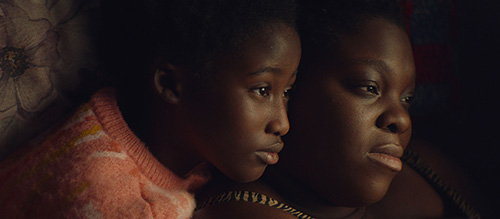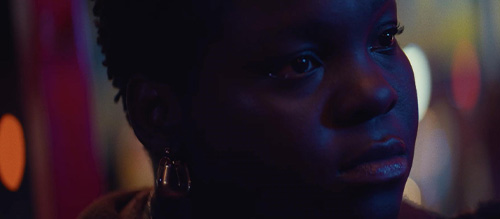
Girl (2023)
Director: Adura Onashile
Screenwriter: Adura Onashile
Starring: Déborah Lukumuena, Le’Shantey Bonsu, Liana Turner, Danny Sapani
Following its world premiere at this year’s Sundance Film Festival, Adura Onashile’s debut feature film opened the 2023 Glasgow Film Festival. Set in the very city hosting its UK premiere, Girl follows a severely traumatised migrant mother, Grace (Déborah Lukumuena), and her daughter Ama (Le’Shantey Bonsu), whose relationship comes under threat when Ama must return to school. Onashile’s short film Expensive Shit had previously won both the audience and the critics award at the Glasgow Film Festival back in 2020, launching Onashile’s career with a bang. Unfortunately, the filmmaker’s feature film debut opened the 2023 festival with a whimper.
There is no denying writer-director Adura Onashile’s talent considering her many years in theatre, including multiple acclaimed and award-winning plays. But as a film director, her lack of experience shows. Many of Girl’s issues come from odd staging and camera framing, and there’s some some jarring editing too. It is unfortunate, then, that it is through the director’s (arguably) greatest strength – writing – that Girl’s most glaring issues arise.
Girl starts strongly, illustrating the close nature of the mother-daughter relationship through their sharing of both a bed and a bathtub. Inseparable. Furthermore, we get a glimpse into the fairy tale world which Grace has placed Ama into, starting with a fable as to how Ama was born. Grace tells her impressionable young daughter that, as a young girl living alone with her grandmother, she went to a well and wished for someone who would always be her friend, and so arrived Ama. What could be an introduction into the ways Grace has manipulated her daughter into staying with her quickly turns sour.
Onashile’s screenplay sticks solely to very broad strokes, with no attention to detail as far as any backstory or world building goes. One could assume that the director hoped to represent the characters not from the country they were from but through their actions, though in doing so unfortunately removes a major part of both of their identities, going so far as to reduce Grace to just a mother and victim.
This issue sinks itself deep into the film, and with it everything crumbles. Grace is such a one dimensional character that her scenes of trauma-induced PTSD fail to engage on an emotional level, which then has a domino effect. Though we understand why Grace is overly protective as a mother, we simply detest the ways in which she chooses to act toward her daughter. Moreover – once again like dominoes – the entire emotional crux of the story, the relationship of the mother and daughter, is something which we do not care for, Girl therefore lacking in engagement for the majority of its ninety-minute runtime.
Although the character of Grace may be the best example of the film’s poor writing, she is by far the last. The rest of the adult cast of characters are simply incompetent. Throughout the film care workers, teachers and even neighbours are portrayed as buffoons who couldn’t help if they tried. For example, when Grace cannot find her daughter and approaches Ama’s school teacher to ask whether she knows where she may be, the teacher’s actions are comparable to a shrug and an “I dunno.” Though this could have been used to great effect to critique the lack of help or care towards immigrants in Britain, it instead illustrates the lack of quality in Onashile’s writing.

Thankfully, a saving grace can be found in Ama, who is a little more fleshed out, who we see the world through. Le’Shantey Bonsu gives a very subdued but nonetheless charming performance as Ama, doing a very good job of displaying her character’s curiosity and desire to explore the world surrounding her through her wide-eyed enthusiasm. By far the best scenes of the film surround her friendship with her school friend Fiona (Liana Turner). Though the pair’s relationship gets off to a rocky start thanks in part to some odd direction and some cringe-worthy dialogue, the chemistry between the two is hard to resist and swiftly takes over. Unfortunately, just as the pair’s story seems to be reaching its peak, the rug is pulled out from under it.
Dialogue and character development are certainly areas in need of improvement in Girl, and so too is the structure of the movie. Not only does the screenplay feel repetitive, but each third of the picture feels like its own individual short film with a clear beginning, middle and end. Not only does this cause some pacing issues, but it creates multiple moments in which we are left both confused and horrified as to how this could possibly be the climax to such a feature.
Once the climax does come, it does not feel deserved. Whilst there are no loose ends per se, no plot point feels as though it has come to a reasonable conclusion, as if limited in their cycle to completion by time restraints. It leaves a terrible taste in the mouth.
Adura Onashile’s progression through Glasgow Film Festival from previous short film award winner to festival opener makes for a wonderful and charming success story, but Girl kicked off the festival in a forgettable fashion. Awkward staging, jarring editing and lacklustre writing simply can’t elevate this disappointing debut from this promising talent.
Score: 5/24

